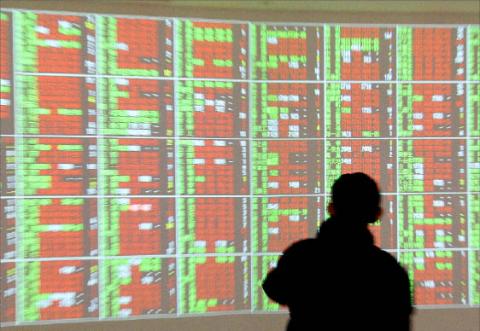The government said yesterday it would continue to use the state-run National Stabilization Fund to support the local stock market for the next three months, a move that is aimed at propping up investor confidence as the nation holds presidential and legislative elections today and amid macroeconomic uncertainty in the near term.
“The fund’s management committee has authorized continued intervention to ensure the stability of Taiwan’s stock market amid ongoing uncertainty over debt in some foreign countries,” the Ministry of Finance said in a press release.
The committee would continue to entrust state-owned financial institutions to invest in the market on behalf of the fund and thereby stabilize the stock market for three months, the release said.

Photo: CNA
The committee activated the fund on Dec. 20, the first time the fund has intervened in the stock market since September 2008. Since then, the TAIEX has risen 7.79 percent, or 518.9 points, closing at 7,181.54 yesterday, the second-highest climb in major stock markets in that period, data from the Taiwan Stock Exchange showed.
However, the TAIEX remains 13.66 percent lower than it was at the end of July last year, a -performance that only the Shanghai Composite Index has done worse than.
The TAIEX yesterday ended 5.04 points, or 0.07 percent, lower at 7,181.54, on turnover of NT$97.84 billion (US$3.27 billion), as political uncertainty ahead of today’s elections prompted investors to pocket early gains on the local bourse.
The NT$500 billion National Stabilization Fund continued its intervention, buying into large-cap stocks, such as Taiwan Semiconductor Manufacturing Co (TSMC, 台積電), smartphone maker HTC Corp (宏達電), Formosa Plastics Corp (台塑) and some financial firms, cushioning the impact of profit-taking, dealers said.
Low market turnover could be another reason the committee has authorized the intervention, they said. Based on stock exchange data, average daily turnover has fallen to as low as NT$71.3 billion in the local bourse since last month.
A reliable source told the Taipei Times yesterday that the fund had spent a total of NT$15.1 billion to stabilize the stock market as of the end of last year.
“Judging from the market movement, I think technical resistance ahead of the 7,200 point mark remains strong,” Horizon Securities (宏遠證券) analyst Benson Huang (黃重善) said.
“The election makes it even more difficult for the market to overcome technical hurdles at this time,” Huang added.
The silver lining was that some large-cap stocks remained resilient, thanks to the fund, although the broader market was overshadowed by non-economic factors, Huang said.
“The expanded turnover shows that some investors are willing to hunt bargains since the stabilization fund helped to restore market confidence to some extent,” he said.
“However, the market was still without a sense of direction,” he said. “Many are waiting for the political uncertainty to lift.”
Among the large-cap stocks, TSMC rose 0.65 percent to end the day at NT$77.50, HTC gained 3.78 percent to close at NT$481.00 and Formosa Plastics closed up 0.84 percent at NT$84.00.

WEAKER ACTIVITY: The sharpest deterioration was seen in the electronics and optical components sector, with the production index falling 13.2 points to 44.5 Taiwan’s manufacturing sector last month contracted for a second consecutive month, with the purchasing managers’ index (PMI) slipping to 48, reflecting ongoing caution over trade uncertainties, the Chung-Hua Institution for Economic Research (CIER, 中華經濟研究院) said yesterday. The decline reflects growing caution among companies amid uncertainty surrounding US tariffs, semiconductor duties and automotive import levies, and it is also likely linked to fading front-loading activity, CIER president Lien Hsien-ming (連賢明) said. “Some clients have started shifting orders to Southeast Asian countries where tariff regimes are already clear,” Lien told a news conference. Firms across the supply chain are also lowering stock levels to mitigate

Six Taiwanese companies, including contract chipmaker Taiwan Semiconductor Manufacturing Co (TSMC, 台積電), made the 2025 Fortune Global 500 list of the world’s largest firms by revenue. In a report published by New York-based Fortune magazine on Tuesday, Hon Hai Precision Industry Co (鴻海精密), also known as Foxconn Technology Group (富士康科技集團), ranked highest among Taiwanese firms, placing 28th with revenue of US$213.69 billion. Up 60 spots from last year, TSMC rose to No. 126 with US$90.16 billion in revenue, followed by Quanta Computer Inc (廣達) at 348th, Pegatron Corp (和碩) at 461st, CPC Corp, Taiwan (台灣中油) at 494th and Wistron Corp (緯創) at

NEW PRODUCTS: MediaTek plans to roll out new products this quarter, including a flagship mobile phone chip and a GB10 chip that it is codeveloping with Nvidia Corp MediaTek Inc (聯發科) yesterday projected that revenue this quarter would dip by 7 to 13 percent to between NT$130.1 billion and NT$140 billion (US$4.38 billion and US$4.71 billion), compared with NT$150.37 billion last quarter, which it attributed to subdued front-loading demand and unfavorable foreign exchange rates. The Hsinchu-based chip designer said that the forecast factored in the negative effects of an estimated 6 percent appreciation of the New Taiwan dollar against the greenback. “As some demand has been pulled into the first half of the year and resulted in a different quarterly pattern, we expect the third quarter revenue to decline sequentially,”

ASE Technology Holding Co (ASE, 日月光投控), the world’s biggest chip assembly and testing service provider, yesterday said it would boost equipment capital expenditure by up to 16 percent for this year to cope with strong customer demand for artificial intelligence (AI) applications. Aside from AI, a growing demand for semiconductors used in the automotive and industrial sectors is to drive ASE’s capacity next year, the Kaohsiung-based company said. “We do see the disparity between AI and other general sectors, and that pretty much aligns the scenario in the first half of this year,” ASE chief operating officer Tien Wu (吳田玉) told an